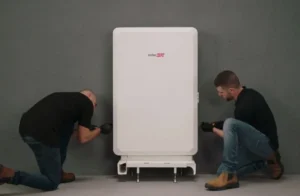Solar PV manufacturers in Australia will be among the first beneficiaries of the federal government’s $1 billion Solar Sunshot program, which opened over the weekend and offers a total of $550 million to help companies scale up commercial manufacturing of solar PV modules and tracking and deployment technologies.
Currently, Australia has one solar panel manufacturer in Tindo Solar, which make their panels offshore and assemble at home – although it’s planning a Queensland factory if it can get government support.
The startup SunDrive is also working on commercialising its home-built technology built around the use of copper rather than silver in solar cells.
The first phase will provide two funding rounds managed by the Australian Renewable Energy Agency. One will make $500 million available to manufacturing focused on solar modules, inputs to modules, and deployment systems.
A further $50 million will be focused on solar PV manufacturing studies, including feasibility and engineering studies
“Solar electricity will be the foundation of Australia’s future energy supply and the key to our net zero and renewable energy superpower ambitions,” ARENA CEO Darren Miller said in a statement.
“We need to build on our history of innovation and extend this into manufacturing across the solar supply chain. The demand for solar required to meet our net zero and renewable energy superpower goals is immense and Australia has the opportunity to build resilience and unlock long-term economic opportunity.”
Under the first phase, ompanies be able to ask for capital grants up to $50 million provided it makes up no more than 50 per cent of the total budget for a project, and up to $350 million in production credits. In the second phase, individual grants in the range of $1-5 million apiece, will be granted.
The two funding rounds exclude companies already operating in Australia’s other emerging industries such as recycling, quality assurance or non-photovoltaic solar technologies.
Neeraj Das, the CEO of solar waste management company Elecsome, was disappointed the first round didn’t offer funding for a wider range of solar industries.
“We were hoping the Sunshot program would offer more for construction-ready companies than just feasibility study funding,” he told Renew Economy.
Elecsome commissioned its first upcycling plant in Victoria this year, and has cut deals with AGL and Italian energy giant Enel Green Power Australia around building processing plants either on their sites or using their materials.
Sircel and Reclaim PV are other companies already working on solar panel recycling in Australia, and earlier this year the Queensland government promised $5 million for the industry.
But with the new arena of quality assurance falling into the feasibility study grant round, PV-Lab partner Dr Michelle McCann is pleased that it could encourage new companies to move into this space.
“We think it’s really important that quality assurance and testing be included, and this is just a beautiful opportunity to include that from the beginning and therefore get what’s made in Australia, and also what’s being imported into Australia, to level up,” McCann told Renew Economy.
“The more we talk about this, the more it’s exposed, it brings the prices of testing down for everybody which brings the overall price of PV down.”
She says the rule of thumb around PV panel testing is that panel makers that know their product will be tested before hitting the market deliver panels that generate 3 per cent higher power on day one.
Building in Australia is doable: study
The Solar Sunshot was announced in March and ARENA CEO Darren Miller says as solar power is set to be the foundation of Australia’s future energy supply, the funding program aims to scale and diversify an industry at home.
“We need to build on our history of innovation and extend this into manufacturing across the solar supply chain. The demand for solar required to meet our net zero and renewable energy superpower goals is immense and Australia has the opportunity to build resilience and unlock long-term economic opportunity,” he says.
The program came on the back of the ARENA-backed Silicon to Solar Study, a “road map” for how Australia can make its own solar.
The study was developed by the Australian PV Institute (APVI) working with Deloitte and a group of key industry stakeholders including The Australian Centre for Advanced Photovoltaics (ACAP), AGL, Aspiradac, Energus, Siemens, SunDrive, Tindo Solar and 5B.
As RenewEconomy reported at the time, the report found that establishing manufacturing capability of 10GW of poly-silicon – a key raw material for making PV – and 5GW across the other steps of the value chain (ingots/wafers, solar cells and panels) is “credible and feasible” with the right government policy support.
In terms of the financial support needed to develop a fully integrated domestic manufacturing capability of minimum viable scale across the value chain, the report gave an estimate of $A3.2 billion over a 10-year production period.







